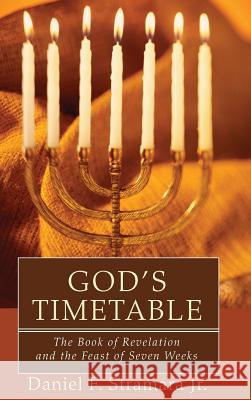God's Timetable » książka
God's Timetable
ISBN-13: 9781498257015 / Angielski / Twarda / 2011 / 202 str.
God's Timetable
ISBN-13: 9781498257015 / Angielski / Twarda / 2011 / 202 str.
(netto: 189,08 VAT: 5%)
Najniższa cena z 30 dni: 195,83
ok. 16-18 dni roboczych.
Darmowa dostawa!
Sets of seven. 666. The Whore of Babylon and the Seven-headed Beast. How would first-century readers have heard these things? One can get at an answer by asking, How does the Book of Revelation compare with contemporaneous Jewish apocalypses? God's Timetable unlocks the hitherto unseen Jewish background to the Apocalypse based on the seven weeks leading up to Pentecost, the Harvest Feast. The meaning of Revelation suddenly becomes clearer. Stramara situates the Book of Revelation in its original context as a prophetic work regarding the end of the world, the final harvest, and Jesus as the fulfillment of expectations. --Daniel Stramara whirls his way through Revelation, imaginatively unfolding a complex web of intriguing possibilities to argue that Revelation draws from liturgical lections associated with the Feast of Weeks (Pentecost). Read along--it's certainly a fun ride. --Warren Carter Professor of New Testament Brite Divinity School --Daniel F. Stramara, in his engaging new work, God's Timetable, sheds light on many of the exegetical enigmas in the book of Revelation. Stramara reads Revelation within the liturgical context of the Feast of Weeks or Pentecost (Shavu'ot), a festival whose apocalyptic significance is attested by other important Jewish writings of John's time. Ultimately, Stramara's work reveals a community very much at home in the world of first century Judaism.-- --Paul B. Duff Associate Dean of Undergraduate Studies The George Washington University --As strange as it may seem, some two millennia after the writing of the Book of Revelation we now have a work that provides an original and convincing account of the meaning of the last book of the Bible. In this blockbuster, Daniel Stramara deciphers some of the most mysterious and puzzling images in Revelation. Carefully grounded in Jewish and Christian scholarship, God's Timetable will be a standard against which future works on Revelation will be measured.-- --Wilburn T. Stancil Professor of Theology and Religious Studies Rockhurst University --While many recent studies on the Apocalypse focus on the resistance of Christians to Empire, Daniel Stramara challenges readers to interpret the Apocalypse in its Jewish setting. His placement of the Apocalypse in the context of the Feast of Weeks (Pentecost) is both compelling and convincing. By proposing the Feast of Weeks as a hermeneutical key for understanding the theological and ideological focus of the Apocalypse, Stramara opens a new window and lets in fresh light on this enigmatic work.-- --David M. May Professor of New Testament Central Baptist Theological Seminary Daniel F. Stramara Jr. is Associate Professor and Chair of the Department of Theology and Religious Studies at Rockhurst University in Kansas City, MO. He regularly teaches a course on the Book of Revelation. Stramara is the author of over twenty articles published in international journals.
Sets of seven. 666. The Whore of Babylon and the Seven-headed Beast. How would first-century readers have heard these things? One can get at an answer by asking, How does the Book of Revelation compare with contemporaneous Jewish apocalypses? Gods Timetable unlocks the hitherto unseen Jewish background to the Apocalypse based on the seven weeks leading up to Pentecost, the Harvest Feast. The meaning of Revelation suddenly becomes clearer. Stramara situates the Book of Revelation in its original context as a prophetic work regarding the end of the world, the final harvest, and Jesus as the fulfillment of expectations.""Daniel Stramara whirls his way through Revelation, imaginatively unfolding a complex web of intriguing possibilities to argue that Revelation draws from liturgical lections associated with the Feast of Weeks (Pentecost). Read along--its certainly a fun ride.--Warren CarterProfessor of New Testament Brite Divinity School ""Daniel F. Stramara, in his engaging new work, Gods Timetable, sheds light on many of the exegetical enigmas in the book of Revelation. Stramara reads Revelation within the liturgical context of the Feast of Weeks or Pentecost (Shavuot), a festival whose apocalyptic significance is attested by other important Jewish writings of Johns time. Ultimately, Stramaras work reveals a community very much at home in the world of first century Judaism.""--Paul B. DuffAssociate Dean of Undergraduate StudiesThe George Washington University""As strange as it may seem, some two millennia after the writing of the Book of Revelation we now have a work that provides an original and convincing account of the meaning of the last book of the Bible. In this blockbuster, Daniel Stramara deciphers some of the most mysterious and puzzling images in Revelation. Carefully grounded in Jewish and Christian scholarship, Gods Timetable will be a standard against which future works on Revelation will be measured.""--Wilburn T. StancilProfessor of Theology and Religious StudiesRockhurst University""While many recent studies on the Apocalypse focus on the resistance of Christians to Empire, Daniel Stramara challenges readers to interpret the Apocalypse in its Jewish setting. His placement of the Apocalypse in the context of the Feast of Weeks (Pentecost) is both compelling and convincing. By proposing the Feast of Weeks as a hermeneutical key for understanding the theological and ideological focus of the Apocalypse, Stramara opens a new window and lets in fresh light on this enigmatic work.""--David M. MayProfessor of New TestamentCentral Baptist Theological SeminaryDaniel F. Stramara Jr. is Associate Professor and Chair of the Department of Theology and Religious Studies at Rockhurst University in Kansas City, MO. He regularly teaches a course on the Book of Revelation. Stramara is the author of over twenty articles published in international journals.











